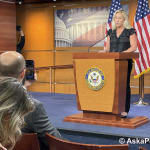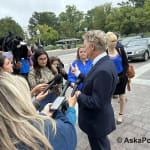Who?
Sen. Ben Cardin (D-MD) — Chair, Senate Foreign Relations Committee
LISTEN: Laslo & Cardin
Background:
On March 14, 2024, Senate Majority Leader Chuck Schumer stood on the Senate floor and called for new elections in Israel, the leader of Palestine to step down and for a two-state solution.
Hours later, in a gaggle with the congressional press corps just off the Senate floor, Senate Foreign Relations Committee Ben Cardin called Schumer’s speech “courageous.”
Ask a Pol asks:
Why is it courageous for a US politician to criticize another nation?
Key Cardin:
“Because, I think, he really made it personal,” Cardin replied. “He told his own personal history into it. I just thought he — he’s courageous, because he deeply feels this. I know Sen. Schumer very well. And he — this is personal to him to be honest to himself and to our country. And to me, when a leader puts that first — I wish more of our leaders had that type of courage.”
Caught our ear:
“I thought Sen. Schumer laid out a blueprint for peace in the Middle East,” Cardin said. “Listen to his entire speech, there’s a lot more in the speech than that one section. And, I think, he is correct … I think October 7th changed things. It’s now up to the Israelis to give us a credible direction on their leadership. We don’t get engaged in domestic politics.”
Below find a rough transcript of Ask a Pol’s interview with Sen. Ben Cardin (D-MD), slightly edited for clarity.
TRANSCRIPT: Sen. Ben Cardin
Ben Cardin: “First, I really encourage everyone to read or listen to his entire speech. He [Sen. Schumer] really laid out a blueprint to how we not only resolve the current crisis but how we can have a lasting peace in the Middle East. And I thought, his blueprint was the right blueprint.”
Reporter #1: “New elections or elections as soon as possible?”
BC: “I think, October 7th changed things in Israel. And the Israelis need to speak as to their leadership. I was not thrilled with the coalition government before October 7th — some members of that coalition government, I don’t believe, should be in any government. I said that before. So I think it’s time for the Israeli political system to move and let us know the direction of their leadership. So you can interpret that any way you want, but I think it’s — that’s how democracies work.”
Reporter #2: “Do you think that Prime Minister Netanyahu should no longer be prime minister at this point?”
BC: “That’s a decision for the Israelis.”
Reporter #3: “Is your position on aid to Israel the same? Do you still believe that the US should provide additional aid at this point?”
BC: “Yes.”
Reporter #4: “But are you comfortable with Schumer going to the floor calling for changes in the government?”
BC: “I thought Sen. Schumer laid out a blueprint for peace in the Middle East. I thought it was well-balanced. And I congratulated him on his speech.”
Reporter #5: “Was it a mistake though for him to call for elections?”
BC: “I think if we read, listen to his entire speech, there’s a lot more in the speech than that one section. And, I think, he is correct as I said earlier. I think October 7th changed things. It’s now up to the Israelis to give us a credible direction on their leadership. We don’t get engaged in domestic politics. That’s something the Israelis…”
Reporter #5: “So it sounds like you think it was a mistake for him to do that.”
BC: “I have not said that. I don’t say that at all. I think he put the speech in context, his views in context. And I thought it was a courageous speech, and I thought it really did lay out the blueprint for lasting peace in Middle East. And that’s something we — sometimes we’ve set up on specific issues that are taking place.”
Matt Laslo: “Why courageous?”
BC: “I may have different disagreements with this government, disagreements with this government’s position in regards to an independent judiciary. So it’s nothing new for me to challenge what Israel’s government is doing. But as to elections, let the Israelis conduct their own elections.”
ML: “But, sir, why ‘courageous’? Why courageous? Is that because of the power of AIPAC [American Israel Political Action Committee]?”
BC: “No. Courageous because I thought he covered all the different points. He didn’t try to choose the specific issues that maybe were more comfortable for his position.”
ML: “But why is it courageous for a US politician to criticize another nation?”
BC: “Because, I think, he really made it personal. He told his own personal history into it. I just thought he — he’s courageous because he deeply feels this. I know Sen. Schumer very well. And he — this is personal to him to be honest to himself and to our country. And to me, when a leader puts that first — I wish more of our leaders had that type of courage.”
Reporter #4: “In regards to UNRWA [United Nations Relief and Works Agency for Palestine Refugees in the Near East] specifically, where are you right now on that fight that’s (inaudible)?”
BC: “Well, I think, it would be a major mistake to prevent UNRWA from operating outside of Gaza. We’ve heard from King Abdullah in regards to Jordan. It would be a mistake for us to put restrictions in that regard. As to UNRWA within the West Bank, I’ve had conversations with the Israelis. I think they recognize — it’s a little complicated. I think, in the short term, UNRWA has certain distribution capacities that no one else has to get humanitarian assistance, and the Israelis acknowledge that. Long term, we’re talking about, which type of an authority is going to be governing the Palestinians, UNRWA will not be engaged in that, because they’ll have their own system, we would think, as an independent state, a sovereign entity.”
Reporter #4: “Can you talk a little more about King Abdullah? I know he’s been talking to a lot of members. He’s been talking to the Israelis. He’s been talking to Leader Schumer.”
BC: “I don’t know. I’ve talked to King Abdullah at least three times in the last two weeks, so he’s been pretty, pretty engaged. He’s been here a while.”
Reporter #4: “Why does it matter so much to him? Just a formality?”
BC: “No, because I think it’s part of his efforts in his own country.”
Reporter #6: “Can I go back to…”
BC: “You have to ask the Jordanian embassy specifically. But my understanding is that UNRWA is in several countries, including Jordan.”
Reporter #6: “Fair. Can we go back to this Schumer issue? The Israeli government has already objected to his remarks. Have you heard from the Israeli officials? Have they complained to you?”
BC: “Well, I’ve been on the run talking to you guys all day long.”
Reporter #6: “Right. Well, just the last couple of minutes.”
Sen. Cardin laughs.
Reporter #6: “Alright, can I go back to this thing where you don’t think we should interfere in internal Israeli politics but you clearly don’t favor the Netanyahu government. But you will not call for — like Schumer did — you will not call for Netanyahu’s replacement?”
BC: “I think it would be very helpful for the Israelis to move in this direction normally. So, a lot has changed since October 7th. We’ve heard different things about this current government’s popularity in Israel. We’re now talking about trying to negotiate peace in Israel. It would be nice to hear from Israelis.”
Reporter #4: “But you’re not calling for it.”
BC: “I’m not gonna…”
Reporter #6: “But do you mean you support a new election, is what you’re saying?”
BC: “I think it’s the way democracies work, it’s new elections.”
Reporter #4: “So is that what you’re saying? You aren’t calling for new elections?”
BC: “I worded it the way I worded it.”
Reporters laugh.
BC: “Pretty clear to me.”
Reporter #6: “Oh yeah, thank you.”
Matt Laslo’s a veteran congressional correspondent, new media prof. & founder of Ask a Pol — a new, people-powered press corps.
Ask a Pol — asking your lawmakers your questions at your US Capitol.
Content posted at AskaPol.com is copyrighted. Use our original content to move the story forward. And, please, link to us.


















Sen. Cardin says "Schumer laid out a blueprint for peace in the Middle East"